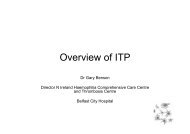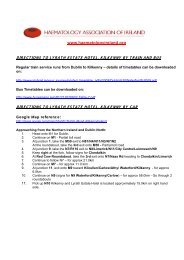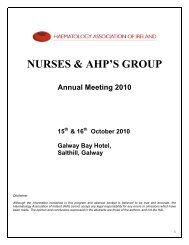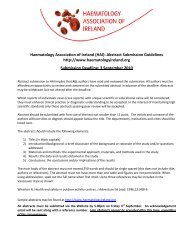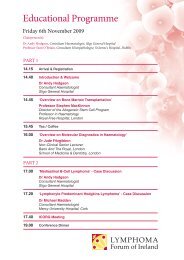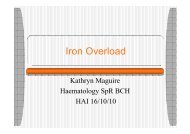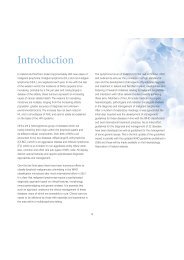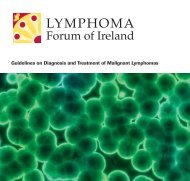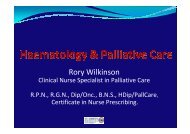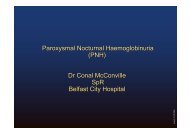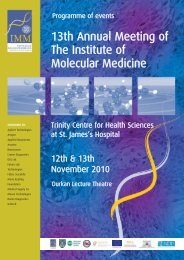Caroline McCaughey - Haematology Association of Ireland
Caroline McCaughey - Haematology Association of Ireland
Caroline McCaughey - Haematology Association of Ireland
You also want an ePaper? Increase the reach of your titles
YUMPU automatically turns print PDFs into web optimized ePapers that Google loves.
C <strong>McCaughey</strong> 1 , B Blackwood 2 , M Brady 3 , MF McMullin 1<br />
1<br />
Department <strong>of</strong> <strong>Haematology</strong>, Belfast City Hospital and Queen's University, Belfast<br />
2<br />
School <strong>of</strong> Nursing and Midwifery, Queen's University, Belfast,<br />
3<br />
Department <strong>of</strong> Anaesthetics, Belfast City Hospital, Belfast, N. <strong>Ireland</strong>
Background<br />
• Controversy – inappropriate use <strong>of</strong> limited resources v denial <strong>of</strong><br />
effective care<br />
• Studies in the 1980’s and 1990’s reported ICU mortality rates <strong>of</strong><br />
80% for patients with malignant disease requiring invasive<br />
ventilation, and 90‐95% for those with multiorgan failure or<br />
requiring renal replacement therapy (McGrath et al., 2010)<br />
• Improving prognosis for patients with haematological<br />
malignancies (NI Cancer Registry, 2010)<br />
• Improvements in ICU outcomes for haematology patients over<br />
last 5 years despite increased intensity treatments (Cuthbertson<br />
et al., 2008)
Aims<br />
• To pr<strong>of</strong>ile patient characteristics and assess outcomes <strong>of</strong><br />
haematology patients admitted to the Belfast City<br />
Hospital ICU<br />
• To establish a baseline against which to re‐audit in the<br />
future and compare against national statistics<br />
• To identify areas for improvement<br />
• To establish trends <strong>of</strong> ICU admission with a view to<br />
developing and refining research question(s) for future<br />
study.
Setting<br />
• <strong>Haematology</strong> Unit<br />
• 29 beds (incorporating 6 transplant beds)<br />
• Total admissions for 2009 = 829<br />
• Intensive Care Unit<br />
• 9 beds (12 up until September 2009)<br />
• Total admissions for 2009 = 660<br />
• <strong>Haematology</strong> ICU admissions in 2009<br />
• 21/829 (2.5%) <strong>of</strong> all haematology admissions<br />
• 21/660 (3.2%) <strong>of</strong> all ICU admissions
Methods<br />
• Audit team – clinical, academic, ICU, <strong>Haematology</strong><br />
• Audit proposal accepted and registered by Trust Audit<br />
Department<br />
• Retrospective audit <strong>of</strong> medical notes; laboratory<br />
records; Intensive Care National Audit and Research<br />
Centre (ICNARC) data<br />
• Population – all adults admitted to Belfast City<br />
Hospital ICU from 1 st January – 31 st December 2009
Results<br />
• 21 adult patients admitted to ICU in 2009<br />
• Mean age 56 years (range 22 – 71 years)<br />
• Male n=11, female n=10
Diagnoses<br />
29%<br />
82% (n=19) had a<br />
malignant diagnosis.<br />
No. Patients<br />
24%
Treatment history prior to current<br />
haematology admission and ICU transfer<br />
At ICU admission 71% (n=15) were post chemo (median 9.9 days, range 1-22 days,<br />
n=1 was day 4 post autograft)
Reasons for admission to ICU<br />
Neutropaenic sepsis (n=18, 85%)<br />
No. Patients
Outcomes –ICU mortality<br />
89% deaths sepsis related
Haematological status on admission to ICU<br />
Haematological status Frequency Percentage<br />
Newly diagnosed malignant disease n=6 28.6%<br />
Newly diagnosed non malignant disease n=2 9.5%<br />
Remission / stable disease n=9 42.9%<br />
Active disease n=1 4.8%<br />
Relapsed disease n=2 9.5%<br />
Refractory disease n=1 4.8%<br />
TOTAL n=21 100%
Haematological status and outcomes<br />
Should patients with active malignant disease be admitted to ICU?<br />
Haematological status Frequency Outcome<br />
Active disease n=1 >6 month survival<br />
Relapsed disease n=2 • Deceased in ICU<br />
• Deceased 67<br />
days<br />
Refractory disease n=1 Deceased 112 days
On admission to ICU ICU survivors (n = 12) ICU non‐survivors (n = 9)<br />
APACHE II score, (mean, SD) 20 (5) 28 (6.6)<br />
No <strong>of</strong> pt’s with neutropenia ≥ grade<br />
3 (n %)<br />
6 (50%) 6 (66.7%)<br />
No <strong>of</strong> pt’s with pancytopaenia ≥<br />
grade 3 (n %)<br />
6 (50%) 6 (66.7%)<br />
No <strong>of</strong> pt’s with liver toxicity ≥ grade<br />
3 (n %)<br />
3 (25%) 7 (78%)
Throughout ICU admission ICU survivors (n = 12) ICU non‐survivors (n = 9)<br />
No <strong>of</strong> pt’s requiring invasive<br />
ventilation (n %)<br />
No <strong>of</strong> pt’s requiring inotropic<br />
support (n %)<br />
No <strong>of</strong> pt’s requiring continuous<br />
renal replacement therapy<br />
Maximum no. <strong>of</strong> organs supported<br />
(mean, SD)<br />
6 (50%) 8 (90%)<br />
3 (25%) 7 (78%)<br />
4 (33%) 3 (33%)<br />
2.25 (1.1) 3 (0.7)<br />
Days in ICU (median, IQR) 4.3 (2, 8) 4 (1, 7)
Mortality<br />
Alive<br />
Deceased<br />
ICU 12 (57%) 9 (43%)<br />
3 months 8 (48%) 13 (62%)<br />
6 months 7 (33%) 14 (67%)<br />
3 months<br />
n=2 died 1-day post ICU (sepsis related multi organ failure; non ICU related death)<br />
n=1 died 2-days post ICU (PE)<br />
n=1 died 67-days post ICU (refractory disease)<br />
6 months<br />
n=1 died 112-days post ICU (refractory disease)
6month survivors ‐ present<br />
haematological status<br />
Haematological status<br />
Frequency<br />
Remission 5<br />
Responding 1<br />
Relapsed 1<br />
TOTAL 7<br />
Two <strong>of</strong> the patients who survived > 6months have progressed to a<br />
potentially curative RIC transplant.
Conclusions<br />
• Most common reason for admission to ICU was<br />
neutropaenic sepsis associated respiratory failure (n=10,<br />
48%)<br />
• Median length <strong>of</strong> stay was 4 days (SD 4.7)<br />
• A third <strong>of</strong> patients survived >6months indicating that<br />
critically ill haematology patients may benefit from ICU<br />
admission, allowing progression to potentially curative<br />
therapies
• The benefit <strong>of</strong> ICU for patients with relapsed or refractory<br />
disease remains ambiguous, however McGrath et al.,<br />
(2010) contend that long term prognosis has minimal<br />
effect on short term prognosis during acute critical illness<br />
• ICU mortality in BCH is identical to ICNARC national<br />
statistics for haematology patients
Recommendations<br />
• Decision to admit haematology patients to ICU should depend<br />
on severity <strong>of</strong> critical illness rather than underlying malignancy<br />
(note non malignant outcomes)<br />
• ICNARC –number <strong>of</strong> failed organs is main prognostic factor for<br />
cancer patients admitted to ICU. Therefore early referral and<br />
prompt admission is critical and careful review <strong>of</strong> the<br />
appropriateness <strong>of</strong> admissions<br />
• Of the 2 BCH patients with multi‐organ failure at time <strong>of</strong><br />
admission to ICU, one died in ICU, and the other one day 1 post<br />
ICU discharge
Recommendations<br />
Areas for future study.<br />
• Most appropriate/preferred place <strong>of</strong> death<br />
• Patient and family experience <strong>of</strong> ICU admission<br />
• Staff attitudes to ICU admissions<br />
• QOL post ICU
Acknowledgements<br />
• Tanya Longmuir, BCH critical care secretary, for her<br />
invaluable help in accessing data from the ICNARC<br />
database
References<br />
• Cuthbertson, B.H., Rajalingham, Y. Harrison, S. and McKirdy, F. (2008) The<br />
outcome <strong>of</strong> haematological malignancy in Scottish intensive care units. Journal<br />
<strong>of</strong> the Intensive Care Society, 9, pp. 135‐140<br />
• Guidelines and audit implementation network (GAIN) http://www.gain‐ni.org/<br />
Accessed September 2010.<br />
• McGrath, S., Chatterjee, F. Whiteley, C. and Ostermann, M. (2010) ICU and 6‐<br />
month outcome <strong>of</strong> oncology patients in the intensive care unit. Quarterly Journal<br />
<strong>of</strong> Medicine, 103, pp. 397‐403<br />
• Northern <strong>Ireland</strong> Cancer Registry (2010) http://www.qub.ac.uk/researchcentres/nicr/Data/OnlineStatistics/<br />
(internet) Accessed September 2010.<br />
• Perry, A.R., Rivlin, M.M., Goldstone, A.H. (1999) BMT patients with lifethreatening<br />
organ failure: when should treatment stop? Journal <strong>of</strong> Clinical<br />
Oncology, 17, pp.298‐303<br />
• Principles for Best Practice in Clinical Audit (NICE/CHI/RCN, 2002). Available<br />
from: http://www.uhbristol.nhs.uk/documents/best_practice_clinical_audit.pdf<br />
(internet) Accessed September 2010.



